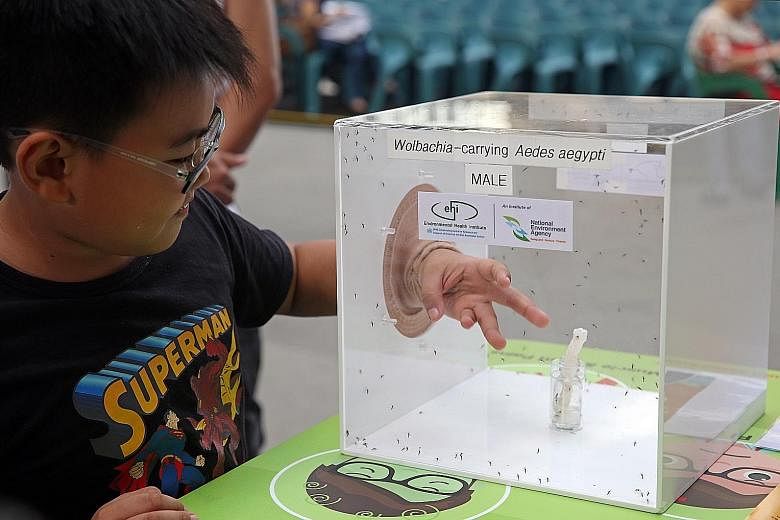The last few days may have been hot but it is likely to get worse from next month till October.
These warmer months also make up the traditional peak dengue season in Singapore, the National Environment Agency (NEA) said yesterday, as it launched the anti-dengue Do the Mozzie Wipeout campaign.
Singapore registered 13,000 dengue cases last year - less than half the projected 30,000. But NEA urged people to remain vigilant by reducing the number of mosquito breeding places at home.
The Aedes aegypti mosquito, the main vector of dengue, also transmits the Zika virus.
"Since the start of 2017, there have been five Zika clusters, all of which are located in the same vicinity, indicating that transmission is ongoing in the area," NEA said.
The only remaining cluster is at the Highland Road/ Jansen Close/ Jalan Sahabat/ Kovan Road and Upper Serangoon Road (D'Pavilion) area. As of March 31, NEA has conducted 290,000 inspections and uncovered 2,700 instances of mosquito breeding habitats.
It has also been trying out a small-scale field study involving the release of male Aedes aegypti mosquitoes artificially infected with the Wolbachia bacteria, at Braddell Heights, Tampines West and Nee Soon East. After mating, the bacteria cause the females to produce eggs that do not hatch, reducing the disease-spreading mosquito population.
The study - launched last October - will conclude by the end of this month. Data collected will be analysed to plan for a larger-scale suppression trial. In February, NEA said about half the Aedes mosquito eggs collected from the Tampines West site did not hatch. This suggested that the released male Wolbachia-Aedes mosquitoes had successfully mated with the urban Aedes aegypti females.
But Minister for the Environment and Water Resources Masagos Zulkifli, speaking at one of the campaign launch sites in Tampines yesterday, said the Wolbachia technology is not a silver bullet.
"It is therefore important that all of us must continue with our efforts to prevent mosquito breeding. This is the impetus for the Do the Mozzie Wipeout campaign... Collectively, we can keep Zika and dengue at bay, and protect not just ourselves, but also our family and friends."
Resident Anne Hoo, 36, said NEA's efforts to raise awareness have paid off. "Mosquitoes are not a problem in my area, and my neighbour who keeps plants is also quite vigilant about ensuring there is no stagnant water in the pots," added the account executive.


